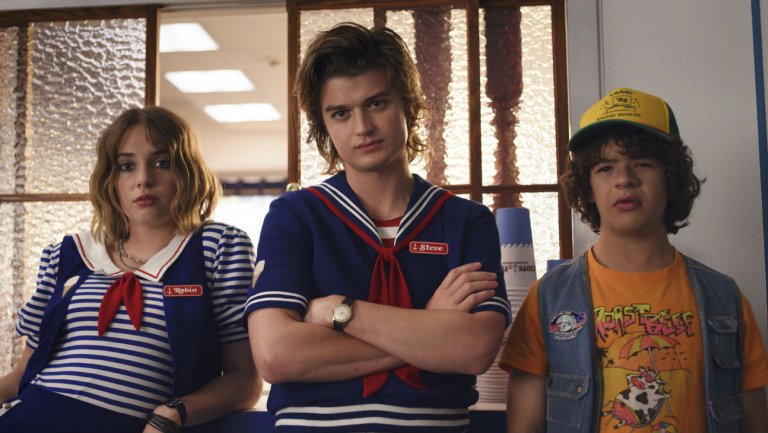In the realm of the supernatural, a secret governmental project investigating the paranormal qualifies as remarkable. So, too, does a potential trial exploring whether Stranger Things creators Matt and Ross Duffer stole the idea for their Netflix show from a guy who allegedly pitched a project at the 2014 Tribeca Film Festival.
On Wednesday, a Los Angeles Superior Court denied summary judgment to the Duffer brothers in a lawsuit brought by Charlie Kessler.
Kessler alleges Stranger Things is based on a feature film script titled The Montauk Project — set in the New York town in which he says is home to “various urban legends, and paranormal and conspiracy theories.”
In January, in response to claims of breaching an implied contract, the Duffer brothers argued they didn’t “manifest any intent to enter into a binding agreement” with Kessler, that they independently created Stranger Things and the ideas Kessler says he disclosed were not novel.
“Charlie Kessler asserts that he met the Duffers, then two young filmmakers whom Kessler never had heard of, and chatted with them for ten to fifteen minutes,” wrote the defendants’ attorney. “That casual conversation — during which the Duffers supposedly said that they all ‘should work together’ and asked ‘what [Kessler] was working on’ — is the sole basis for the alleged implied contract at issue in this lawsuit and for Kessler’s meritless theory that the Duffers used his ideas to create Stranger Things.”
In denying summary judgment Wednesday, Los Angeles Superior Judge Michael Stern says there is no “novel” requirement under either New York or California law.
The judge then turns to Faris v. Enberg, a 1979 appellate decision upholding a trial court’s conclusion that no implied in fact contract could be formed when the plaintiff had voluntarily submitted his idea for the purpose of establishing a future business relationship.
“The present situation presents far different facts than those detailed in Enberg,” writes the judge in a short order. “The circumstances under which [Kessler] claims to have submitted his ideas to the defendants are not analogous. The plaintiff’s claimed expectations also differ significantly. He contemplated commercial exploitation and profitability… Triable issues of fact remain to be determined concerning what plaintiff said, what he meant to convey by his conversation and how the defendants responded before it can be definitively concluded whether or not an implied in fact contract was formed.”
Kessler alleges that Stranger Things derives from his concept for a sci-fi story set near an abandoned military base.
The Duffers have submitted declarations that this isn’t remotely true — that they’ve long been fascinated by urban legends and conspiracy theories and began working on a film on the topic in 2010.
Stern says the problem with these declarations about independent creation is that they lack verifying evidence of the originality of their idea.
“Without such admissible evidence, we are left with an issue of determining credibility that must be decided by the trier of fact,” rules the judge. “Moreover, whether or not there is a similarity between the concepts to be discerned by comparing them is a subissue of independent creation that must be decided by the trier of fact.”
As a result of Wednesday’s decision, the Duffers seem on the way towards a trial currently scheduled to begin on May 6.
Kessler has been pushing for documents and a deposition from Netflix, and next week, the court is scheduled to hold a hearing on what evidence may be precluded from the trial on relevancy and prejudicial grounds. The Duffers wish to preclude evidence of alleged copying of other works, to preclude evidence of their net worth, to preclude evidence of insurance coverage and to preclude evidence of the compensation and earnings received from Netflix.
On the issue of other copying, Kessler’s attorney says a former roommate of the Duffers has come forward to allege they used his ideas to create the screenplay for “Hidden” and that it goes to the issue of intent. The plaintiff also says that earnings from the show are relevant to prove the value of Kessler’s idea and that he should essentially be deemed as their partner in the creation of the series.
“If Defendants made $1 million from writing and producing a Series, a show that exists solely because of the ideas pitched to them by Mr. Kessler under the implied contract, then Mr. Kessler’s damages for his share of the joint venture would be one-third of the monies received, or $333,333.33.”
The Duffers have already brought a motion to seal portions of the trial because of the prospect of highly confidential information. In a court brief this week, an attorney for the Duffers told the judge that “public disclosure threatens substantial harm not only to their legitimate privacy interests, but also as to their ongoing commercial efforts, including by revealing confidential information that may be included in future episodes of Stranger Things and weakening the Duffers’ (and Netflix’s) position in future commercial negotiations.”
Katherine Chilton, a director of content litigation at Netflix, has submitted her own declaration warning the judge that disclosure of agreements with the Duffers would cause the company significant harm.
“The Duffer Brothers have our full support,” says a Netflix spokesperson. “This case has no merit, which we look forward to being confirmed by a full hearing of the facts in court.”
Responds Michael Kernan, attorney for Kessler: “Now that the Judge has ruled and denied their motion for summary judgment, we can now dispense with the nonsense promoted by the Duffers and Netflix that this lawsuit has no merit, and that they had ‘proof’ that they created the show. If the lawsuit had no merit, or if they actually had the ‘proof’ they created it, then their summary judgment would have won. They lost. These motions are very hard to fight and winning this Motion shows Mr. Kessler has a good case. We look forward to proving Mr. Kessler’s case at trial.”
This article originally appeared in The Hollywood Reporter.





